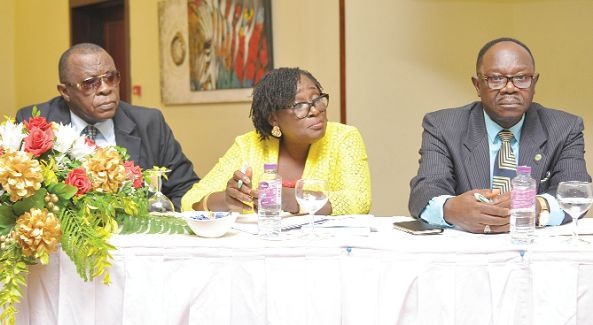
Police to hand spot fines to indisciplined drivers
The Ghana Police Service will, by the end of June this year, begin the implementation of spot fines to tackle indiscipline on the country’s roads, the Executive Director of the National Road Safety Commission (NRSC), Mrs May Obiri-Yeboah, has said.
She said seven years after the passage of the road traffic regulation, it was now time to operationalise the spot fine system.
Under the new system, to be led by the police, drivers who flout road regulations for a number of times will also have their licences revoked.
“We hope that this intervention will help deal with reckless and indisciplined drivers on our roads,” Mrs Obiri-Yeboah added.
She announced this at a national dialogue event on the menace of road accidents organised by the West Africa Nobles Forum (WANF) on the theme: “The carnage on our roads: Causes and solutions”.
Participants discussed pertinent issues on road safety in Ghana, where accidents claim an average of 2,000 lives and causes injury to thousands others annually.
Offences
Offences that will attract the spot fine include jumping the red light, driving without a seatbelt and licence and the use of wrong licence for vehicles.
Others are speeding, failure to carry a fire extinguisher, refusal to renew roadworthy certificate, use of unspecified tinted glass, driving a vehicle without reflectors and failure to wear protective clothing while on a motorbike.
The rest are driving on the shoulders of the road, talking on phone while driving, use of a foreign driving licence and obstruction at intersection or pedestrian crossing.
The system will be linked to the database of the Driver and Vehicle Licensing Authority (DVLA) register to make it possible for the police in every part of the country to easily access the particulars of drivers.
The police, who are to enforce the law, will not handle money from offenders but issue tickets to suspects to pay stipulated fines at commercial banks and on other digital platforms.
The system was supposed to be introduced in May 2013 but had to be suspended after public outcry over the possibility of its abuse by the police.
Accidents
Mrs Obiri-Yeboah further said 90 per cent of road crashes in the country were due to human error, vehicles that were not roadworthy, bad road designs, among others.
She observed, however, that “most Ghanaians have the belief that road accidents are inevitably caused by dark forces. Witches, wizards, secret societies and demons are responsible for road accidents.
Prayers are, therefore, said at the beginning of journeys to blind such evil forces”, instead of taking precautionary measures, including vehicle inspection and the prevention of drunk drivers from leaving lorry stations.
“Road traffic crashes have become a public health menace and we have to deal with them before they wipe out all our productive young people,” she added.
According to the NRSC, almost 58 per cent of road accident victims in Ghana are between zero and 35 years.
On commercial motorbikes, popularly known as Okada, Mrs Obiri-Yeboah said the commission was currently involved in a nationwide consultation to review the law on their operations.
Advice
The President-General of WANF, Rev. Dr Paul Fynn, urged drivers to always keep their eyes on the road to avoid accidents.
He said road accidents, the second major cause of death after malaria in the country, needed to be tackled.
The Executive Secretary of WANF, Dr Dee Otibu Asare, appealed to the First Lady, Mrs Rebecca Akufo-Addo, to add the construction of an orthopaedic hospital to her projects to provide specialist treatment for road accident victims.


